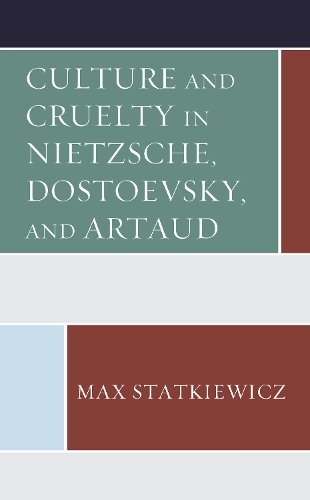
Culture and Cruelty in Nietzsche, Dostoevsky, and Artaud
(Hardback)
Publishing Details
Culture and Cruelty in Nietzsche, Dostoevsky, and Artaud
By (Author) Max Statkiewicz
Bloomsbury Publishing PLC
Lexington Books
9th December 2019
United States
Classifications
Professional and Scholarly
Non Fiction
809.93384
Physical Properties
Hardback
136
Width 160mm, Height 235mm, Spine 17mm
386g
Description
Questioning the Enlightenment in Nietzsche, Dostoyevsky, and Artaud challenges the cultural optimism of the Enlighten through an examination of Nietzsche, Dostoevsky, and Artaud. The Enlightenment was characterized, as Arnold put it, as sweetness and light. Nietzsche, Dostoevsky, and Artaud each pushed back against the optimism of the enlightenment through their writing and advanced the idea of cruelty as lying at the root of all human nature and culture. In this study, Statkiewicz explores the seemingly opposing notions of culture and cruelty within the works of these authors to discuss their complex relationship with one another.
Reviews
In Culture and Cruelty in Nietzsche, Dostoevsky, Artaud, Max Stakiewicz deals, once again, with the "old quarrel" between poetry and philosophy. In his previous book - Rhapsody of Philosophy. Dialogues with Plato in Contemporary Thought (2009) - Stakiewicz had already called into question the very idea of such a "quarrel" by showing that the dialogue between "rigor" (akribeia) and "play" (paidia) can be read in Plato himself as a non-conflict. By rethinking the relationship between philosophy and poetry in contemporary thought, Rhapsody of Philosophy concludes that poetry and philosophy are not antagonists, but rather complicit knowledge processes.
In this new book, Stakiewicz goes back to the so-called "Ode to Man" in Sophocles' Antigone - human being is the most wonderful and the most terrible thing that there is - to argue that culture and cruelty are not binaries but rather different ways of understanding the complex world we live in. Against Matthew Arnold's culture as "sweetness and light," which tends to oversee cruelty, Stakiewicz stresses the disquieting power of art by analyzing the revelation of cruelty in his exemplary study of three poet-philosophers or philosopher-poets: Nietzsche, Dostoevsky, and Artaud. Difference in the culture, Stakiewicz shows us in the work of these three artists, is what resists the dreadful nihilism of indifference in a culture that goes on wrecking violence and destruction all over the world.
Through an original and profound reading of the works of Nietzsche, Dostoevsky and Artaud, this book traces the re-emergence in modern culture of a theme whose roots go back to classical antiquity: the regenerative and creative power of cruelty. The argument for the complementary relationship of culture and cruelty and for cruelty's ability to unsettle and to call into question received ideas makes this work not only a major scholarly study of modernist literature and philosophy, but also an important contribution to the current debate on the meaning, functions and boundaries of culture.
Author Bio
Max Statkiewicz is associate professor of comparative literature and folklore studies at the University of Wisconsin, Madison.
